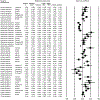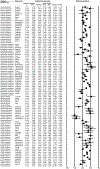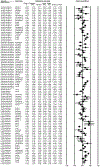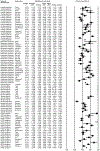Everyday life experiences and mental health among conflict-affected forced migrants: A meta-analysis
- PMID: 31846902
- PMCID: PMC7064367
- DOI: 10.1016/j.jad.2019.11.165
Everyday life experiences and mental health among conflict-affected forced migrants: A meta-analysis
Abstract
Background: There are a growing number of forced migrants worldwide. Early detection of poor adjustment and interventions to facilitate positive adaptation within these communities is a critical global public health priority. A growing literature points to challenges within the post-migration context as key determents of poor mental health.
Aims: The current meta-analysis evaluated the association between daily stressors and poor mental health among these populations.
Method: A systematic search in PsycINFO, PubMed, and Web of Science identified relevant studies from inception until the end of 2018. Effect sizes (correlation coefficients) were pooled using Fisher's Z transformation and reported with 95% confidence intervals. Moderator and mediator analyses were conducted. The protocol is available in PROSPERO [CRD42018081207].
Results: Analysis of 59 eligible studies (n = 17,763) revealed that daily stressors were associated with higher psychiatric symptoms (Zr=0.126-0.199, 95% CI=0.084-0.168, 0.151-0.247, p<0.001) and general distress (Zr=0.542, 95% CI=0.332-0.752, p<0.001). Stronger effect sizes were observed for mixed daily stressors relative to subjective, interpersonal, and material daily stressors, and for general distress relative to posttraumatic stress symptoms and general well-being. Effect sizes were also stronger for children and adolescents relative to adults. Daily stressors fully mediated the associations of prior trauma with post-migration anxiety, depressive, and post-traumatic stress disorder symptoms.
Conclusions: This meta-analysis provides a synthesis of existing research on the role of unfavorable everyday life experiences and their associations with poor mental health among conflict-affected forced migrants. Routine assessment and intervention to reduce daily stressors can prevent and reduce psychiatric morbidity in these populations.
Keywords: Anxiety; Depression; Everyday life; Forced migrants; Post-traumatic stress disorder; Refugees.
Copyright © 2019. Published by Elsevier B.V.
Conflict of interest statement
Declaration of Competing Interest All other authors declare that they have no conflicts of interest.
Figures





References
-
- Akhtar P, Marr NE, Garnevska EV, 2012. Coordination in humanitarian relief chains: chain coordinators. J. Humanit. Logist. Supply Chain Manag 2, 85–103. 10.1108/20426741211226019 - DOI
-
- Almeida DM, 2005. Resilience and vulnerability to daily stressors assessed via diary methods. Curr. Dir. Psychol. Sci 14, 64–68. 10.1111/j.0963-7214.2005.00336.x - DOI
-
- Antonovsky A, 1987. Unraveling the Mystery of Health: How People Manage Stress and Stay Well. Jossey-Bass, San Francisco.
-
- Baltes MM, Maas I, Wilms H-U, Borchelt M, Little TD, 1999. Everyday Competence in Old and Very Old Age: Theoretical Considerations and Empirical Findings, in: Baltes PB, Mayer KU (Eds.), The Berlin Aging Study., New York, pp. 384–402.
Publication types
MeSH terms
Grants and funding
LinkOut - more resources
Full Text Sources
Medical

